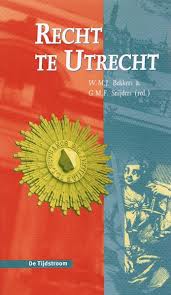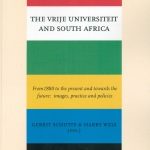Recht te Utrecht – Ten slotte
 Ter completering van deze bundel over het recht en de rechtspleging, volgen hierna enige cijfers die een globaal beeld geven van ontwikkelingen die de advocatuur heeft doorgemaakt. Behalve landelijke cijfers worden ook gegevens over het arrondissement Utrecht weergegeven, althans voor zover deze beschikbaar zijn. [Cijfers uit 1993, red. RQ]
Ter completering van deze bundel over het recht en de rechtspleging, volgen hierna enige cijfers die een globaal beeld geven van ontwikkelingen die de advocatuur heeft doorgemaakt. Behalve landelijke cijfers worden ook gegevens over het arrondissement Utrecht weergegeven, althans voor zover deze beschikbaar zijn. [Cijfers uit 1993, red. RQ]
Voorts is een overzicht opgenomen van de presidenten van de rechtbank en de hoofdofficieren van justitie te Utrecht sedert 1838, gevolgd door een lijst van de dekens van de Orde van Advocaten te Utrecht sedert 1904.
De Nederlandse Orde van Advocaten (NovA) is opgericht op 1 oktober 1952. de orde is een publiekrechtelijk orgaan waarvan alle Nederlandse advocaten verplicht lid zijn (artikel 17 Advocatenwet). De Orde voorziet in een behoefte aan een gecentraliseerde organisatie van de balie met verordenende bevoegdheid. Tot 1952 heeft er een organisatie voor advocaten bestaan, de Nederlandse Advocaten-Vereeniging, waarvan het lidmaatschap niet verplicht was.
Met name de laatste twintig jaar is het aantal advocaten sterk toegenomen. Terwijl in 1970 nog slechts 2.063 advocaten ingeschreven stonden, bedroeg hun aantal per 1 januari 1994 al 7.595. De balie groeide gedurende deze jaren gemiddeld met 5%. Indien de groei in hetzelfde tempo doorzet verwacht het CBS dat het aantal advocaten in het jaar 2000 omstreeks 10.000 zal bedragen. Read more
ISSA Proceedings 2010 – Preface
 The Seventh Conference of the International Society for the Study of Argumentation (ISSA), held in Amsterdam from 29 June to 2 July 2010, drew again more submissions for presentations than any ISSA Conference before. After a strict selection procedure, exactly 300 scholars were invited to present their papers at the Conference. In addition, the Conference attracted some 200 interested colleagues and students who just wanted to attend the presentations and take part in the discussions. All in all, 500 people interested in argumentation assembled in Amsterdam to present papers and exchange views.
The Seventh Conference of the International Society for the Study of Argumentation (ISSA), held in Amsterdam from 29 June to 2 July 2010, drew again more submissions for presentations than any ISSA Conference before. After a strict selection procedure, exactly 300 scholars were invited to present their papers at the Conference. In addition, the Conference attracted some 200 interested colleagues and students who just wanted to attend the presentations and take part in the discussions. All in all, 500 people interested in argumentation assembled in Amsterdam to present papers and exchange views.
The 2010 ISSA Conference was, like previous ones, an international meeting place for argumentation scholars from a great variety of academic backgrounds and traditions, representing a wide range of academic disciplines and approaches: (speech) communication, logic (formal and informal), rhetoric (classical and modern), philosophy, linguistics, discourse analysis, pragmatics, law, political science, psychology, education, religious studies, and artificial intelligence. Besides papers on argument schemes, classical argumentation theory, critical responses to argumentation, deep disagreement, ethos and pathos, fallacies, the history of argumentation theory, interpersonal argumentation, logic and reason, practical argumentation, premise acceptability, rationality and reasonableness, topoi, the Toulmin model, visual argumentation, and argumentation in a cross-cultural perspective, papers were presented on argumentation in controversy, debate, education, science and the media, on argumentation in a financial, historical, legal, literary, medical, political and religious context, and on argumentation and computation, definition, epistemology, ethics, linguistics, persuasion, political philosophy, pragmatics, social psychology, stylistics, and the Internet. In the opinion of the editors, the Proceedings of the Seventh ISSA Conference reflect the current richness of the discipline. Read more
ISSA Proceedings 2010 – Table of Contents
Table of Contents ISSA Proceedings 2010
Frans H. van Eemeren, Bart Garssen, David Godden & Gordon Mitchell, Preface
Don Paul Abbott, “War with Words”: I.A. Richards’ Attack on Argument
Rodica Amel, The Probable and the Problem
Ruth Amossy, Polemical Discourse on the Net: “Flames” in Argumentation
Corina Andone, The Reasonableness of Retracting a Standpoint in a Political Interview
Gregory Bassham, Should “Argument” Be Defined Without Reference to Use?
Mark Battersby & Sharon Bailin, Critical Inquiry: Considering the Context
Hilde Van Belle, Rhetorical Figures and Their Chances in Hybrid Media
Floris Bex & Bart Verheij, Arguments, Stories and Evidence: Critical Questions for Fact-finding
Sarah Bigi, Institutional Constraints on the (Un)Sound Use of the Argument from Expert Opinion in the Medical Context
Frans Birrer & Wouter Mensink, The Virtual World of Policy Arguments: The Case of the Electronic Health Record
Carole Blair, V. William Balthrop & Neil Michel, Enthymemes of Relation and National Legitimation: Argument and Tombs of the Unknown
J. Anthony Blair, Logic in the Pragma-Dialectical Theory
George Boger, Argumentation and Contemporary Concerns for Justice:Shifting Focus from the Universal Audience to the Common Good
Patrick Bondy, On the Priority of Epistemic Rationality
Antonio Bova, Implicitness Functions in Family Argumentation
Lilit Brutian, Stylistic Devices and Argumentative Strategies in Public Discourse
Ann E. Burnette & Wayne L. Kraemer, Nobel Diplomacy: The Rhetoric of the Obama Administration
ISSA Proceedings 2010 – “War With Words”: I.A. Richards’ Attack On Argument
 In The Philosophy of Rhetoric (1936) I. A. Richards proposed to revive “an old subject” that had “sunk so low” that it perhaps should be simply dismissed to “limbo” (Richards 1936/1965, p. 3). In Richards’ view rhetoric’s sorry condition was a result of the flaws of the “old rhetoric” which he says began with Aristotle and ended with Richard Whately in the nineteenth century (Richards 1936/1965, p. 4). The “old rhetoric” was “an offspring of dispute” that “developed as the rationale of pleadings and persuadings; it was the theory of the battle of words and has always been itself dominated by the combative impulse” (Richards 1936/1965, p. 24). Whately’s Elements of Rhetoric (1828) represents the inadequacies of the old rhetoric because it offers nothing more than a “collection of prudential Rules about the best sorts of things to say in various argumentative situations” (Richards 1936/1965, p. 8).
In The Philosophy of Rhetoric (1936) I. A. Richards proposed to revive “an old subject” that had “sunk so low” that it perhaps should be simply dismissed to “limbo” (Richards 1936/1965, p. 3). In Richards’ view rhetoric’s sorry condition was a result of the flaws of the “old rhetoric” which he says began with Aristotle and ended with Richard Whately in the nineteenth century (Richards 1936/1965, p. 4). The “old rhetoric” was “an offspring of dispute” that “developed as the rationale of pleadings and persuadings; it was the theory of the battle of words and has always been itself dominated by the combative impulse” (Richards 1936/1965, p. 24). Whately’s Elements of Rhetoric (1828) represents the inadequacies of the old rhetoric because it offers nothing more than a “collection of prudential Rules about the best sorts of things to say in various argumentative situations” (Richards 1936/1965, p. 8).
Richards’ rejection of traditional rhetoric and his promise to revive the subject made The Philosophy of Rhetoric one of the foundational documents of the “New Rhetoric” of the twentieth century. Thus it is important to examine the assumptions of Richards’ indictment of rhetoric and consider if he is correct that it is no more than a “war with words” (Richards, 1955, p. 52). And even if Richards’ historical analysis is accurate, it does not necessarily follow that a disputational model must be abandoned if rhetoric is to prosper in our own times. Richards’ identification of argumentation as rhetoric’s chief disability has had significant implications for the direction of both rhetoric and argumentation. I will argue that Richards’ program to remove argument from rhetoric would, if followed fully, eviscerate rhetoric by stripping away stripping away much of the most fully developed and articulated aspects of rhetorical theory and practice. Moreover, Richards’ self-proclaimed “microscopic” view of rhetoric means that The Philosophy of Rhetoric has little to contribute to the development of rhetoric, or argumentation, in the twenty-first century. Read more
ISSA Proceedings 2010 – The Probable And The Problem
 1. Introductory remarks
1. Introductory remarks
1.1. Questioning the axiomatic principles is no more a contradiction in terms.
Modern philosophers of science, Albert Einstein among them, established the relative status of foundational propositions of any paradigm. In spite of paradigmatic relativity, axiomatic principles do not lose their constitutive role[i].
The progressive axiomatization of sciences and the constitution of theoretical paradigms in many fields of research entitle us to adopt this method for the analysis of doxa – the domain we are interested in. “Doxa, though it is the general word for ‘belief’, tends to carry with it the hidden, but sometimes operative implication, that the belief in question is an assessment of something”, says Crombie (1963, pp. 33-34).
1.2. The intention of speaking about paradigmatic structure of doxa was explicitly manifested by Gianni Vattimo (1993, pp. 90-108)[ii] and probably by many other philosophers. Consequently, it is not necessary to supply more proofs in supporting our theoretical position. It is important to emphasize that, from our point of view, the paradigmatic analysis of doxa is rather a method than a theory, part of the interlocutors’ critical device. The formal criteria of a theoretical paradigm – coherence, concision, and exhaustiveness, as expressed by Thomas Kuhn (1976), represent the points where the cooperative and rational principles of doxastic argumentation can be critically examined, intuitively by interlocutors, explicitly by theoreticians.
Being an “assessment of something”, doxa is dominated by axiology.
We define an axiological paradigm the multitude of empirically axiological propositions (judgments of value, practical decisions, norms, orders, etc.) that can be reduced to a doxa concept. The basic meaning is crystallized in the form of a general definition which grounds the respective ensemble of propositions in a coherent, concise, and exhaustive way. Paradigmatic analysis of doxa refers to traditionally formulated doxastic categories. Read more
ISSA Proceedings 2010 – Polemical Discourse On The Net: “Flames” In Argumentation
 Studies in CMC have investigated the phenomenon of “flame” and “flaming”, understood as aggressive and hostile interactions via email and online discussions. While borrowed from popular discourse, the notion has been the object of various inquiries in communication studies and social psychology, raising questions such as its exact definition, its exclusive or non-exclusive belonging to online communication, its socio-psychological sources and its functions in virtual interactions. In this paper, unlike most of the scientific literature rooted in the social sciences, I will adopt a broad argumentative approach to flaming, analyzing it as a discursive and argumentative phenomenon pertaining to polemical discourse. I will borrow my case study from a specific online genre: talkbacks and, more specifically, ordinary citizens’ debates concerning public affairs in electronic newspapers.
Studies in CMC have investigated the phenomenon of “flame” and “flaming”, understood as aggressive and hostile interactions via email and online discussions. While borrowed from popular discourse, the notion has been the object of various inquiries in communication studies and social psychology, raising questions such as its exact definition, its exclusive or non-exclusive belonging to online communication, its socio-psychological sources and its functions in virtual interactions. In this paper, unlike most of the scientific literature rooted in the social sciences, I will adopt a broad argumentative approach to flaming, analyzing it as a discursive and argumentative phenomenon pertaining to polemical discourse. I will borrow my case study from a specific online genre: talkbacks and, more specifically, ordinary citizens’ debates concerning public affairs in electronic newspapers.
I will first devote a short section to the notion of flaming in the social sciences in order to see how it can be translated into the field of argumentation. I will then try to integrate it into a coherent theory of polemical discourse in general, and of online controversy in particular. Read more


